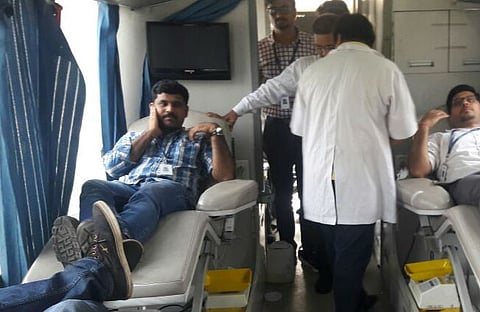

World Blood Donor Day falls on June 14 each year and is celebrated worldwide to commemorate the birthday of Austrian biologist, Karl Landsteiner, who is considered the Father of Transfusion Medicine. It is also a day to thank voluntary blood donors and is also a means to increase awareness about donating blood.
Even with science advancing leaps and bounds, there is no substitute for blood and blood products when the need for transfusion arises. Yet, a large number of people harbour several incorrect beliefs about blood donation, which need to be addressed.
Bengaluru-based 58-year-old Bhoopendran first donated blood in 1989, and since then he’s gone in to do so every few months. “February 17, 1989 was the first time I went in to donate blood. Since then, I’ve donated many times, and will continue to do so,” he said.
Bhoopendran is one of the city’s most active blood donors, whose blood and blood products have aided in saving countless lives.
“I never had much hesitancy to donate blood, it is done for a good cause,” he added.
Why the hesitancy to donate?
This is not always the case though. Dr Susan Williams is a Consultant Pathologist and Blood Bank Officer at SPARSH hospital in Bengaluru, who has had to counsel numerous people about blood donation.
“So many people still have a lot of misconceptions about blood donation. Many seem to believe that if they donate blood, they become weak or that they won’t be able to do work. We have to counsel them and explain to them that it won’t affect them, and we have to tell them why it is important that they donate blood,” she says.
Typically, about 350ml to 450ml of blood is taken from one donor, which is not a significant enough amount to cause any negative impact to the donor. “Most people can actually donate blood once every 3 months without it affecting them in any manner,” added Dr Susan.
“Some people are also under the impression that donating blood can lead to contracting various infections. That’s not true. For recipients, we have various stringent measures in place to ensure that the blood is screened before it is given. We test for HIV, hepatitis, syphilis, malaria and so on to catch the infection in the window period itself, to ensure that the blood being transfused to a patient is free from such diseases,” she said.
No central registry of donors
Another part of the problem has to do with the lack of an established centralised registry, which some organisations have taken upon themselves to rectify.
Alphonse Kurian is the Chairman of the Blood Donation Committee at Lions Club of Bangalore in Sanjaynagar. The organisation works round the clock through the year to bridge the gap between donors and recipients.
The organisation has a donor directory of hundreds of people who have enlisted themselves to be called upon as a donor, should someone require blood, in a number of cities in the country.
“There is no centralised network in Bengaluru, people come to us from different agencies, or on their own through some contacts. We have a database of listed donors whom we reach out to according to the needs,” he said, “Even today we had three young men who went all the way to Electronics City and donated blood without hesitation because a 6-week-old baby needed AB positive blood.”